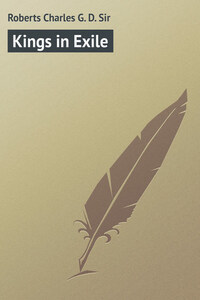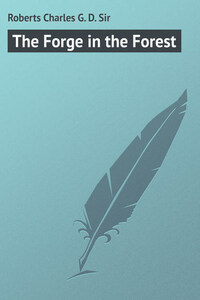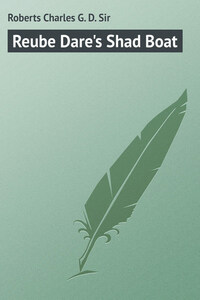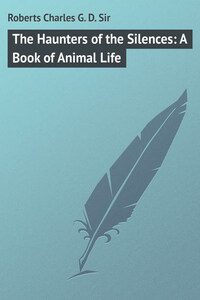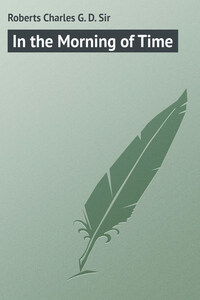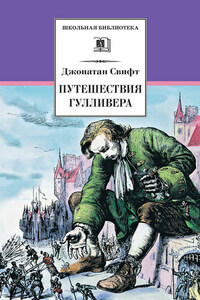CHAPTER I
The Sound in the Night
UPON the moonlit stillness came suddenly a far-off, muffled, crashing sound. Just once it came, then once again the stillness of the wilderness night, the stillness of vast, untraversed solitude. The Boy lifted his eyes and glanced across the thin reek of the camp-fire at Jabe Smith, who sat smoking contemplatively. Answering the glance, the woodsman muttered “old tree fallin’,” and resumed his passive contemplation of the sticks glowing keenly in the fire. The Boy, upon whom, as soon as he entered the wilderness, the taciturnity of the woodsfolk descended as a garment, said nothing, but scanned his companion’s gaunt face with a gravely incredulous smile.
So wide-spread and supreme was the silence that five seconds after that single strange sound had died out it seemed, somehow, impossible to believe it had ever been. The light gurgle of the shallow and shrunken brook which ran past the open front of the travellers’ “lean-to” served only to measure the stillness. Both Jabe and the Boy, since eating their dinner, had gradually forgotten to talk. As the moon rose over the low, fir-crested hills they had sunk into reverie, watching the camp-fire die down.
At last, with a sort of crisp whisper a stick, burnt through the middle, fell apart, and a flicker of red flame leaped up. The woodsman knocked out his pipe, rose slowly to his feet, stretched his gaunt length, and murmured, “Reckon we might as well turn in.”
“That’s all right for you, Jabe,” answered the Boy, rising also, tightening his belt, and reaching for his rifle, “but I’m going off to see what I can see. Night’s the time to see things in the woods.”
Jabe grunted non-committally, and began spreading his blanket in the lean-to. “Don’t forgit to come back for breakfast, that’s all,” he muttered. He regarded the Boy as a phenomenally brilliant hunter and trapper spoiled by sentimental notions.
To the Boy, whose interest in all pertaining to woodcraft was much broader and more sympathetic than that of his companion, Jabe’s interpretation of the sound of the falling tree had seemed hasty and shallow. He knew that there was no better all-round woodsman in these countries than Jabe Smith; but he knew also that Jabe’s interest in the craft was limited pretty strictly to his activities as hunter, trapper and lumberman. Just now he was all lumberman. He was acting as what is called a “timber-cruiser,” roaming the remoter and less-known regions of the wilderness to locate the best growths of spruce and pine for the winter’s lumbering operations, and for the present his keen faculties were set on the noting of tree growths, and water-courses, and the lay of the land for the getting out of a winter’s cutting. On this particular cruise the Boy–who, for all the disparity in their years and the divergence in their views, was his most valued comrade–had accompanied him with a special object in view. The region they were cruising was one which had never been adequately explored, and it was said to be full of little unnamed, unmapped lakes and streams, where, in former days, the Indians had had great beaver hunting.
When the sound of the falling tree came to his ears across the night-silence, the Boy at once said to himself, “Beavers, at work!” He said it to himself, not aloud, because he knew that Jabe also, as a trapper, would be interested in beavers; and he had it in his mind to score a point on Jabe. Noiseless as a lynx in his soft-soled “larrigans,” he ascended the half-empty channel of the brook, which here strained its shrunken current through rocks and slate-slabs, between steep banks. The channel curved steadily, rounding the shoulder of a low ridge. When he felt that he had travelled somewhat less than half a mile, he came out upon a bit of swampy marsh, beyond which, over the crest of a low dam, spread the waters of a tranquil pond shining like a mirror in the moonlight.
The Boy stopped short, his heart thumping with excitement and anticipation. Here before him was what he had come so far to find. From his books and from his innumerable talks with hunter and trapper, he knew that the dam and the shining, lonely pond were the work of beavers. Presently he distinguished amid the sheen of the water a tiny, grassy islet, with a low, dome-shaped, stick-covered mound at one end of it. This, plainly, was a beaver house, the first he had ever seen. His delighted eyes, observing it at this distance, at once pronounced it immeasurably superior to the finest and most pretentious muskrat-house he had ever seen–a very palace, indeed, by comparison. Then, a little further up the pond, and apparently adjoining the shore, he made out another dome-shaped structure, broader and less conspicuous than the first, and more like a mere pile of sticks. The pond, which was several acres in extent, seemed to him an extremely spacious domain for the dwellers in these two houses.
Presently he marked a black trail, as it were, moving down in the middle of the radiance from the upper end of the pond. It was obviously the trail of some swimmer, but much too broad, it seemed, to be made by anything so small as a beaver. It puzzled him greatly. In his eagerness he pushed noiselessly forward, seeking a better view, till he was within some thirty feet of the dam. Then he made out a small dark spot in the front of the trail,–evidently a beaver’s head; and at last he detected that the little swimmer was carrying a bushy branch, one end held in his mouth while the rest was slung back diagonally across his shoulders.

